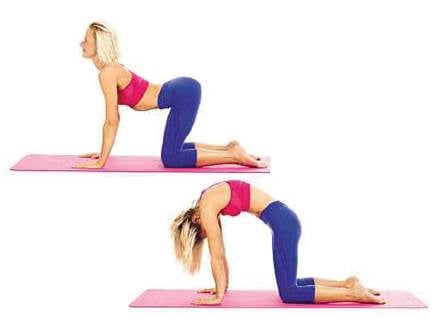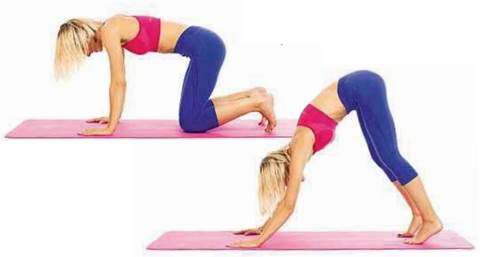Calling all office workers! Yoga is
the key to soothing aches and pains and building a strong, trouble-free spine
Back pain is a big problem and chances are,
you know all about it. It’s one of the most commonly treated health problems in
the UK and is often a result of sitting ¡n one position for a long period of
time (hello, work desk), a weak core or an inactive lifestyle.
Chronic back pain is classed as any pain
that lasts for six weeks. Even though particularly bad back pain like this
could tempt you to take it easy on the workouts, the trick is never to cut Out
activity altogether - keeping mobile helps to decompress your spine so that it
remains as supple as possible. In fact, staying active plays such a vital role
in beating back pain, it’s been estimated that the NHS could cut down on the
staggering $2.1 billion a year spent on back pain treatment by simply prescribing
a course of yoga classes to patients.
It could mean fewer sick days, too.
Researchers from the University of York and Hull York Medical School put yoga
to the test in a 12-week program for back-pain sufferers and compared it to
conventional GP treatment. They found that those practicing yoga only took four
days off during this period, costing around $561 per person, while the group
using the conventional treatment took 12 days off work, adding up to about
$1803. Plus, members of the yoga group were able to do 30 per cent more
activities compared with those in the usual care group after the three months.
‘Regularly performing a simple sequence of
yoga poses can help soothe back pain and better align the spine, hips and
legs,’ explains Jennifer Ellis from London yoga studio Yotopia (yotopia.co.uk).
‘It’s important to balance out a strengthened and lengthened abdominal core
with the natural primary and secondary curvature of the back. This should be
done without over-emphasizing a hardened abdominal core, which can place
further stress on the spine.’
Jennifer has helped us devise an easy
pain-relieving yoga sequence you can perform anywhere. Practiced carefully,
this simple sequence will help with the symptoms associated with back pain.
‘The body likes to move!’ Jennifer explains. Just remember to consult your
doctor before attempting any new form of exercise if you suffer from a serious
back condition.
How to do it
Perform these poses in a sequence, flowing
from one to the next. One sequence is fine for beginner and intermediate yogis,
but if you’re more experienced you can increase the difficulty by holding the
poses for longer. If necessary, take a break between each posture, resting in
child’s pose.
Child’s pose
Technique

Child’s
pose
Start by sitting on your heels with you r
big toes touching and your knees apart, leaving room for your body to settle
between your knees.
Exhale and fold your body over your thighs,
allowing your forehead to rest on the mat; your arms can be extended forward or
placed alongside your legs.
Rest in this pose for a few minutes,
allowing your body to soften and open naturally, with your spine neutral.
Cat cow
Technique

Cat
cow
Draw up onto all fours, with your hands
underneath your shoulders and your knees underneath your hips. Unlock and
soften your elbow joints.
Inhale, gently drawing your sternum and
chin forward as you soften your shoulder blades and lift your tailbone upwards
(this is cow pose).
Exhale and drop your chin to your chest,
rounding the spine and dropping your tailbone (this is cat pose).
Repeat 5 to 10 times.
Puppy dog and downward doc
Technique

Puppy
dog and downward doc
From cat pose, curl your toes underneath
you, then draw your bottom backward and straighten your arms.
Elongate your spine and lengthen your neck.
This is puppy dog pose - remain in this pose for 5 to 10 breaths.
In hale, pressing into your palms and
drawing your knees off the mat, into downward dog.
Exhale as you straighten your legs,
pressing back through your legs and broadening the back of your knees. Allow
your heels to drop and lengthen your spine toward your hands
Draw your shoulder blades apart and your
back toward your ribs. Hold this position for 5 to 10 breaths.
Drop down to puppy dog position, then
child’s pose. Repeat 3 to 5 times.